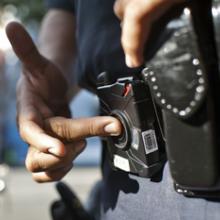The Los Angeles City Council Wednesday unanimously approved a $69.6 million plan to place body worn cameras on 7,000 Los Angeles patrol officers by the end of 2017.
Originally, L.A. Mayor Garcetti had promised to have cameras on LAPD officers by the end of the year to improve accountability by both police and citizens, and provide evidence in criminal trials. City council members, however, balked at the price tag and approval was delayed six months.
A study commissioned by the council and unveiled Tuesday predicted eventual cost savings from body cameras. Justice and Security Strategies, the consultant commissioned for the report, said LAPD can expect to pay less in litigation costs after body cameras roll out, since they could absolve officers accused of misconduct, and deter use of force by officers.
The plan includes a $31 million contract with Taser International, which will supply the cameras, uploading equipment and storage. The rest of the money will go to things like extra LAPD staff to review and manage the footage.
Garcetti hailed the decision.
"Today's action by the City Council is an investment in my vision of a Los Angeles Police Department that leads in transparency and accountability - values that protect officers and everyday Angelenos, and that are fundamental to policing in the 21st century," Garcetti said in a statement. "This is a historic moment for the LAPD, and I am proud of the leadership shown by everyone who played a part in getting us to this day."
Body cameras have become a much-vaunted tool as controversy over police shootings of civilians has heated up nationwide.
The LAPD will become the largest police department in the nation to have its officers wear body cameras.
Already, 860 patrol officers around the city have cameras through a pilot program.
Justice Security Strategies said it's too early in that program to determine what cost savings L.A. has seen since the roll-out.
Body camera footage, however, is already showing up in criminal prosecutions and in evaluations of officer-involved shootings in L.A.
Jane Robison, a spokesperson for L.A. County District Attorney Jackie Lacey, said footage from police-worn cameras has yet to make its way into an actual criminal trial, but that's unsurprising considering most criminal cases end in plea deals.
Footage has been used in prosecutions, she said.
"We are looking at them and also handing them over to the defense," Robison said.
Body-worn camera footage has also played a role in LAPD's own evaluations of officer-involved shootings, including the controversial shooting of a homeless man on Skid Row in March 2015.
The LAPD, civilian Police Commission and prosecutors deemed the shooting justifiable, citing the footage in their decision.
Body-worn camera footage has not generally been made public. LAPD Chief Charlie Beck has consistently opposed public access to the footage.
Presumably, should material captured by body cameras make its way into a criminal or civil trial, the footage would then become public.











